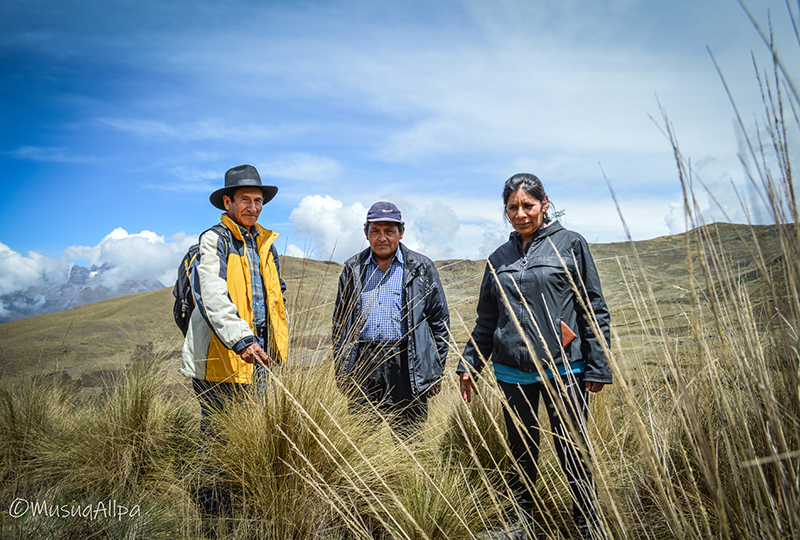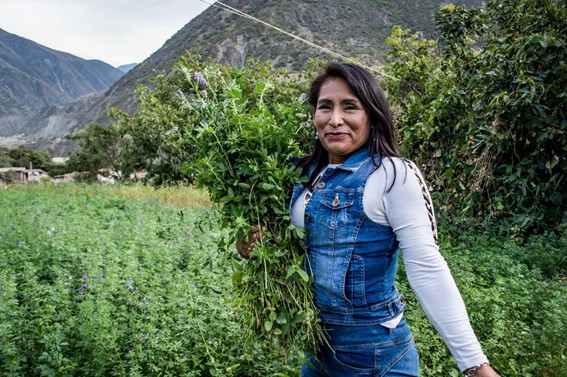Participants in EUROCLIMA's Agua Urbana's 'Water for Abancay' project share their stories of transformation on the road to resilient management and sustainable water use, a process in which communities, and their willingness to join efforts to address climate change, are protagonists.
Abancay, Peru. May 2023. "The Valley of Eternal Spring" is how Abancay is known, an Andean valley in southern Peru, surrounded by mountains, Andean forests and rivers that cross the city. One of them is the Mariño River, a tributary of the Pachachaca River, and one of the water sources of the Amazon River.
The Mariño micro-watershed is the intervention area of the Water for Abancay and Communities project, financed by the European Union's EUROCLIMA+ Program through the Urban Water sector, implemented by the French Development Agency (FDA) and the Spanish Agency for International Development Cooperation (AECID). This project seeks to contribute to ensuring the future availability, equitable access, and responsible use of water in the micro-watershed.
During the implementation of the project, we have learned many stories of change that are committed to resilient and sustainable water management. Stories like that of Bacilia Valer, a brave woman with long hair and a curious look, who is the treasurer of the Llañucancha Community. This community has about 200 inhabitants, 80 of whom accompany Bacilia in reforestation and qochas to "have more humidity". Bacilia knows well the importance of taking care of forests and water, because a few years ago she experienced a major wildfire. "It was very sad," she recalls. "Now no one will do any harm, we are going to reforest. This is already a reserved area," she says.
Like her, Alfredo Bazán, president of the community, and Santos Pineda, Commoner, comment on how they prepare for times of drought, saving water in times of rain, which benefits their community, the communities of the lower part, and Abancay.

Wilbert Wilca with EPS technicians in charge of the construction of new reservoirs | Photo: Musuq Briceño
We are accompanied by Wilbert Wilca, president of EPS Emusap Abancay, a partner in the project. "We have been promoting the Water Ecosystem Services Retribution Mechanisms, which involve the communities in a governance platform and make it possible to organize activities in the upper reaches. Thanks to the project, work continues to strengthen the watershed headwaters to reserve water, optimize drinking water treatment, and provide a better service".
Wilbert notes that they are now more aware of the conservation and recovery of Andean ecosystems and vegetation cover. "Gaining the trust of the communities has been a process. We are articulating the urban part with the rural part," concludes Wilbert[1].
[1].

Danny, an engineer who has decided to work for better water quality for Abancay | Photo: EPS Emusap Abancay
Going down the watershed, we met Danny Saavedra, a young civil engineer [1], who has decided to stay in Abancay to continue working in water management. In Peru, many young people migrate to Lima in search of better opportunities.
He was responsible for hydrological monitoring and conducted the analysis of the various hydrological stations [2]. "With climate change, water management in the basin becomes essential," he says with concern about the possibility of a future with water scarcity. "The ecosystem recovery, a good water management, its treatment and improvement of catchments favours the supply of drinking water for all of Abancay," he says. Danny is an example for more young people.
In the city, we met Yenny Sequeiros, a loving mother and resident of Abancay. She tells us that it is becoming more and more expensive to pay for water, so she is very careful with her water consumption. "I take advantage of the rainwater I collect from the roof. That water goes into a tank and with it I can clean my house and water the plants," Yenny tells us.
The measures that she implemented for an efficient use of drinking water are already showing results in her pocket. "I decided to save water and it is reflected in the bill. Here, we are afraid that one day the water will be insufficient, we will not be able to irrigate or produce and we will have nothing to eat. That's why I started for myself, aiming to spread the idea to others so that we can all conserve water", Yenny ends proudly and with a big smile, as she knows that her daughter is learning too[1].
[1].

Yenny is an agricultural engineer and Illary's exemplary mother. Both implement good practices to optimize water use. | Photo: Nicolas Villaume
As we descend the basin, we find ourselves in the valley. The climate is warm, and the sun is always shining. In their fields, the villagers grow vegetables and fruits. One of them is Janeth Pampa, a hardy and enthusiastic community member, who is very active in the project implementation.
"Before, we did not have good coordination and agreement among the stakeholders in the watershed. It is only with the project that we are waking up. Now we know how to get together and work in the upper, lower, and middle zones," says Janeth.
"We support planting and water harvesting. Water resources depend on us; if we don't take care of them, they go away, so the wetlands and marshes dry up. We must have a vision for the future so that we don't lack water and we don't have to be in need," she concludes.
Water resources depend on us; if we don't take care of them, they go away, so the wetlands and marshes dry up. We must have a vision for the future so that we don't lack water and we don't have to be in need".
Janeth Pampas proudly shows off her harvest. She knows about the importance of water and is an activist for its conservation and care in Abancay | Photo: Musuq Briceño
In climate change context, more present every day, our communities and populations are facing new challenges that must be addressed through prevention, management and resilience actions. The sustainable and integrated management of water resources in a territory will depend on awareness of the importance of conserving natural resources and on the articulation of local stakeholders at all levels. A more united people are stronger and can overcome future adversities. That is why we have been providing seeds of change through this project.
We invite you to visit the Mariño River micro-watershed and the city of Abancay on the following virtual platform:
https://www.euroclima.org/inmersion
(only in Spanish))

The "Water for Abancay and Communities" project is developed within the framework of the EUROCLIMA Program and is implemented by the French Development Agency - FDA. It is led by SUNASS and executed by Helvetas Peru. Local partners are EPS Emusap Abancay and CEDES Apurimac.
About Urban Water of EUROCLIMA+
Through this sector of the EUROCLIMA+ program, implemented by the Spanish Agency for International Development Cooperation (AECID) and the French Development Agency (FDA), six projects are being executed. For more information on each project visit: https://www.euroclima.org/en/water
About EUROCLIMA+
EUROCLIMA+ is a program funded by the European Union and co-financed by the German federal government through the Federal Ministry for Economic Cooperation and Development (BMZ), as well as by the governments of France and Spain through the Ministry of Foreign Affairs, European Union, and Cooperation.
The Program's mission is to reduce the impact of climate change and its effects in 18 countries in Latin America and the Caribbean by promoting mitigation, adaptation, resilience, and climate investment. It is implemented according to the "Spirit of Team Europe" under the synergistic work of seven agencies: Spanish Agency for International Development Cooperation (AECID), FDA Group: French Development Agency (FDA)/ Expertise France (EF), Economic Commission for Latin America and the Caribbean (ECLAC), International and Ibero-American Foundation for Public Administration and Policy (FIIAPP), Deutsche Gesellschaft für Internationale Zusammenarbeit (GIZ) GmbH and the UN Environment Program.
[1] Story on the Immersion360 platform: https://www.nv-vr.com/rutadelagua-peru/poi/6402342bf1dfc
[1] Danny Saavedra holds a Master's degree in Engineering Sciences with a major in Water Resources and Environment from the University of Chile.
[2]Source: https://www.facebook.com/HelvetasPeru/videos/343470157126548
[1] Webinar "Knowing the experience of water management in Abancay" https://www.youtube.com/live/9--s9-5FFCU?feature=share


